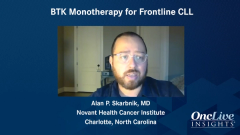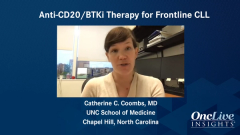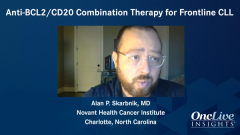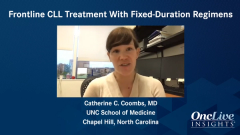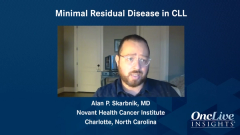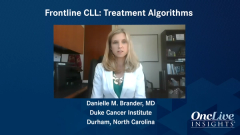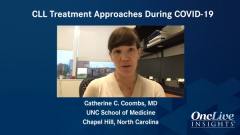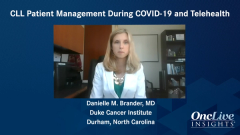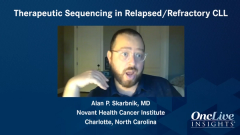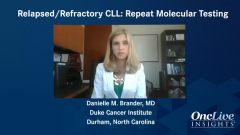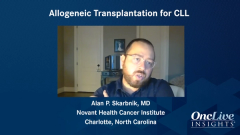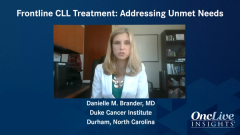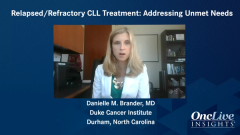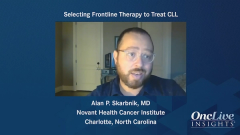
CLL Treatment Approaches During COVID-19
Episodes in this series

Catherine C. Coombs, MD: In light of the pandemic, we have had a trend of doing more BTK [Bruton tyrosine kinase] inhibitors. The benefit of doing BTK inhibitors, which are oral-only options, is that there are fewer clinic visits and therefore less risk for potential exposures. That being said, we still initiate patients on venetoclax-based treatment approaches. If there are preferences for a time-limited regimen, it can be done safely. Now that we are many months into the pandemic, most institutions have adopted safety protocols such as universal masking and screening for COVID-19 [coronavirus disease 2019] symptoms. These make the visits safer than at the beginning, before we had these standard procedures established.
Outpatient initiation of venetoclax-obinutuzumab is feasible for many patients. There is a subset that will need inpatient administration, at least in this day and age, based on having a very bulky lymph node that doesn’t shrink enough in that 3-week OB [obinutuzumab] lead-in. Also, some patients have an abnormal kidney function that need close inpatient monitoring. It’s feasible, but it’s not always possible in every single patient based on those factors that can come into play.
The current role for chemoimmunotherapy has become slim with the adoption of all these novel treatment regimens that, in most cases, have superior efficacy. However, there is a select patient population in which chemoimmunotherapy can be considered, and that patient population, specifically young and fit patients, who have mutated immunoglobulin heavy chain mutation status. The reason that that FCR [fludarabine, cyclophosphamide, rituximab] as the main chemoimmunotherapy option is still reasonable, is that there have been long term follow-ups of the early studies that show over half of patients with that profile mutated IGHV who get FCR [fludarabine, cyclophosphamide, rituximab] are still in remission. That is a great benefit to be able to be in remission 10 or 15 years out.
It also is with great cost, and FCR [fludarabine, cyclophosphamide, rituximab] is an extremely toxic regimen. When we have that discussion with patients who fit that profile, very few want to proceed with FCR [fludarabine, cyclophosphamide, rituximab] because of these long-term risks. The 1 that is most worrisome for patients is a risk of a secondary myeloid neoplasm, which occurs in 2% to 8% of patients getting FCR [fludarabine, cyclophosphamide, rituximab]; that’s a life-changing and often fatal complication. There is this benefit in that slim population of young, fit, mutated IGHV patients, but at great cost.
The optimal therapy for a patient with high-risk biologic markers depends on what the high-risk marker is. Let’s discuss an unmutated immunoglobulin because those patients can respond well to both BTK inhibitor up front and venetoclax-obinutuzumab. Those are both acceptable options for a patient who has unmutated IGHV as their high-risk marker.
Let’s contrast with the other very high-risk marker, which is the 17p deletion or TP53 mutation. There is some concern in the CLL [chronic lymphocytic leukemia] community that time-limited therapy may not offer as great of a benefit as up front BTK in that subset. Those 2 have not been compared head-to-head, but when you look at the cross-trial comparison, looking at the TP53-mutated or -deleted patients from CLL14, there is a 70% PFS [progression-free survival] at the 2-year mark. In contrast, when you look at the long term follow-up of BTK inhibitors, specifically of ibrutinib in patients with 17p and TP53 deletion, it seems that their PFS is longer. There are motivated patients with 17p and TP53 that’s acceptable to do venetoclax-obinutuzumab depending on what their goals are. If their goal is to have time off therapy, it can be considered. Discuss with them that based on somewhat limited data and nonrandomized data, the most likely longest PFS benefit that they would get is from a BTK inhibitor up front. It’s at the expense of potential toxicity and the need for indefinite therapy until progression.
Transcript Edited for Clarity


